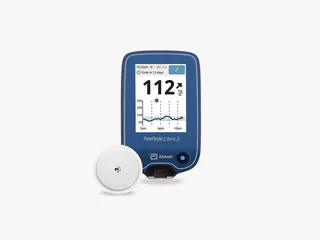In recent years, blood-sugar tracking has emerged as a significant health trend. While traditionally associated with diabetes management, this practice has gained popularity among health enthusiasts, fitness buffs, and individuals seeking to optimize their well-being. Continuous Glucose Monitors (CGMs) are at the forefront of this movement, advanced devices designed to provide real-time insights into glucose levels. But is this trend worth the hype? In this blog, we will explore the concept of CGMs, evaluate their benefits and drawbacks, and help you decide if blood-sugar tracking is a good idea for you.
What Are Continuous Glucose Monitors?
Highly developed gadgets called continuous glucose monitors test the interstitial fluid’s glucose levels continually under the skin. Unlike traditional blood glucose meters that require finger-prick tests, CGMs provide a more convenient and comprehensive way to monitor glucose fluctuations throughout the day.
How CGMs Work
A typical CGM system consists of three main components:
Sensor
A small, thin sensor is inserted under the skin to measure glucose levels.
Transmitter
Attached to the sensor, it sends glucose data to a receiver or smartphone app.
Receiver/App
Displays glucose levels in real-time, allowing users to track trends and patterns.
The Rise of Blood-Sugar Tracking
Blood sugar tracking has transcended its initial use in diabetes management to become a popular tool for health optimization. This shift is driven by the increasing availability of Continuous Glucose Monitors and the growing awareness of how glucose levels can impact overall health.
Reasons Behind the Trend
Health Optimization
Many people are now interested in understanding how their diet, exercise, and sleep impact their glucose levels.
Preventive Health
For those without diabetes, CGMs offer a preventive approach to avoid future health issues related to blood sugar imbalances.
Personalized Insights
CGMs provide real-time data, helping users make informed decisions about their health and lifestyle.
Benefits of Using Continuous Glucose Monitors
Continuous Glucose Monitors offer a range of benefits that extend beyond traditional blood sugar management:
Real-Time Glucose Monitoring
CGMs provide continuous, real-time data on glucose levels, allowing users to see how their glucose fluctuates throughout the day. This immediate feedback helps users understand how different foods, activities, and even stress levels affect their blood sugar.
Better Diabetes Management
For individuals with diabetes, CGMs offer more detailed insights than traditional glucose meters. They help track trends, identify patterns, and make necessary adjustments to insulin dosages and lifestyle choices.
Early Detection of Glucose Issues
CGMs can detect glucose levels that are too high or too low, alerting users before problems become severe. Early detection can lead to timely interventions, potentially preventing more serious health issues.
Data-Driven Health Decisions
By analyzing data collected from CGMs, users can make more informed decisions about their diet, exercise, and medication. This data-driven approach helps in setting realistic health goals and achieving better outcomes.
More Read About : Why Continuous Glucose Monitors Should Not Be Normalized
Drawbacks of Continuous Glucose Monitors
Despite their advantages, Continuous Glucose Monitors are not without drawbacks. It’s important to consider these factors before deciding to invest in a CGM.
Cost
CGMs can be expensive, especially for those who do not have diabetes and are seeking to use them for health optimization. The cost includes not only the initial purchase but also ongoing expenses for sensors and transmitters.
Accuracy Issues
While CGMs are generally accurate, they are not infallible. Factors like sensor calibration, skin conditions, and physical activity can affect the accuracy of glucose readings.
Privacy Concerns
Continuous monitoring generates a lot of data, which can raise privacy concerns. Users should be mindful of how their health data is managed and shared, especially if using third-party apps.
Not a Substitute for Medical Advice
While CGMs provide valuable information, they do not replace professional medical advice. Users should consult with healthcare providers before making significant changes to their health regimen based on CGM data.
Who Should Consider Using Continuous Glucose Monitors?
Continuous Glucose Monitors are not suitable for everyone. Here’s a breakdown of who might benefit the most from using CGMs:
People with Diabetes
For those managing diabetes, CGMs are a powerful tool for better blood sugar control and improved quality of life.
Health Enthusiasts and Biohackers
Individuals interested in optimizing their health and understanding how different variables affect their glucose levels may find CGMs beneficial.
People at Risk for Diabetes
For individuals at high risk of developing diabetes, CGMs offer a preventive measure to monitor glucose levels and make lifestyle changes early.
Alternatives to Continuous Glucose Monitors
If a CGM doesn’t seem like the right fit for you, there are alternative methods for tracking blood sugar and maintaining health:
Traditional Glucose Meters
Less expensive but requires regular finger-prick tests.
Health Apps and Wearables
Offer general health insights but lack specific glucose monitoring.
Diet and Exercise Tracking
It can help manage overall health without glucose-specific data.
Conclusion
Blood sugar tracking through Continuous Glucose Monitors is indeed a growing health trend, offering numerous benefits for those who need detailed glucose data for diabetes management or health optimization. However, it is important to weigh the benefits against the costs and limitations. For people with diabetes or those at risk of developing it, CGMs can be a valuable tool. For health enthusiasts, they offer a new way to explore personal health metrics.
Ultimately, whether Continuous Glucose Monitors are a good idea depends on your individual health needs, goals, and budget. It’s always a good practice to consult with a healthcare professional to determine if this technology aligns with your health objectives.


